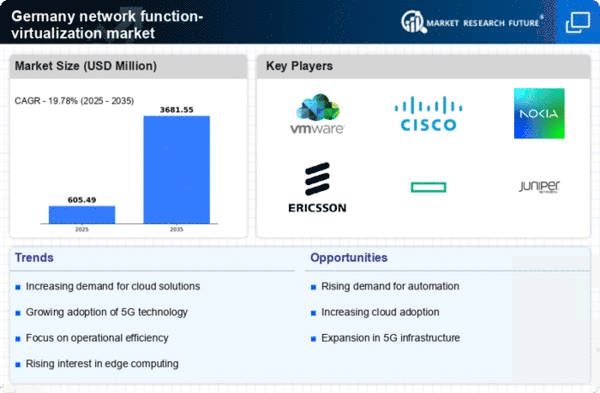Shift Towards 5G Implementation
The rollout of 5G technology is significantly influencing the network function-virtualization market in Germany. As telecommunications providers upgrade their infrastructure to support 5G, there is a corresponding need for virtualized network functions that can efficiently manage increased data traffic and connectivity demands. The market is projected to grow by 20% in the next few years, driven by the necessity for scalable and flexible network solutions. This transition not only enhances user experience but also opens new avenues for service innovation, thereby propelling the network function-virtualization market forward.
Rising Demand for Cost Efficiency
The network function-virtualization market in Germany is seeing a notable surge in demand for cost efficiency among enterprises. Organizations are increasingly seeking solutions that reduce operational expenses while enhancing service delivery. By virtualizing network functions, companies can minimize hardware costs and optimize resource allocation. This shift is evidenced by a projected growth rate of approximately 15% annually in the adoption of virtualization technologies. As businesses strive to streamline their operations, the network function-virtualization market is positioned to benefit significantly from this trend, as it offers a compelling value proposition for cost-conscious organizations.
Enhanced Network Security Requirements
In the context of the network function-virtualization market, the growing emphasis on network security is a critical driver. With the rise in cyber threats, German enterprises are prioritizing robust security measures. Virtualized network functions enable organizations to implement advanced security protocols and real-time threat detection mechanisms. This shift is reflected in the increasing investment in security solutions, which is expected to reach €3 billion by 2026. As companies recognize the importance of safeguarding their digital assets, the network function-virtualization market is likely to see heightened demand for integrated security features.
Growing Focus on Digital Transformation
Digital transformation initiatives are becoming increasingly prevalent among German enterprises, driving the network function-virtualization market. Organizations are adopting virtualization to modernize their IT infrastructure and improve agility. This trend is underscored by a survey indicating that 70% of companies in Germany are prioritizing digital transformation strategies. By leveraging network function-virtualization, businesses can enhance their operational efficiency and responsiveness to market changes. As the demand for innovative digital solutions continues to rise, the network function-virtualization market is expected to thrive in this evolving landscape.
Increased Collaboration Among Industry Players
The network function-virtualization market is witnessing a surge in collaboration among various stakeholders, including telecom operators, technology providers, and regulatory bodies. This collaborative environment fosters innovation and accelerates the development of new solutions tailored to meet market demands. Partnerships are emerging to enhance interoperability and streamline deployment processes. As a result, the market is anticipated to grow by 12% over the next few years. This collaborative approach not only strengthens the ecosystem but also positions the network function-virtualization market for sustained growth and advancement.
















